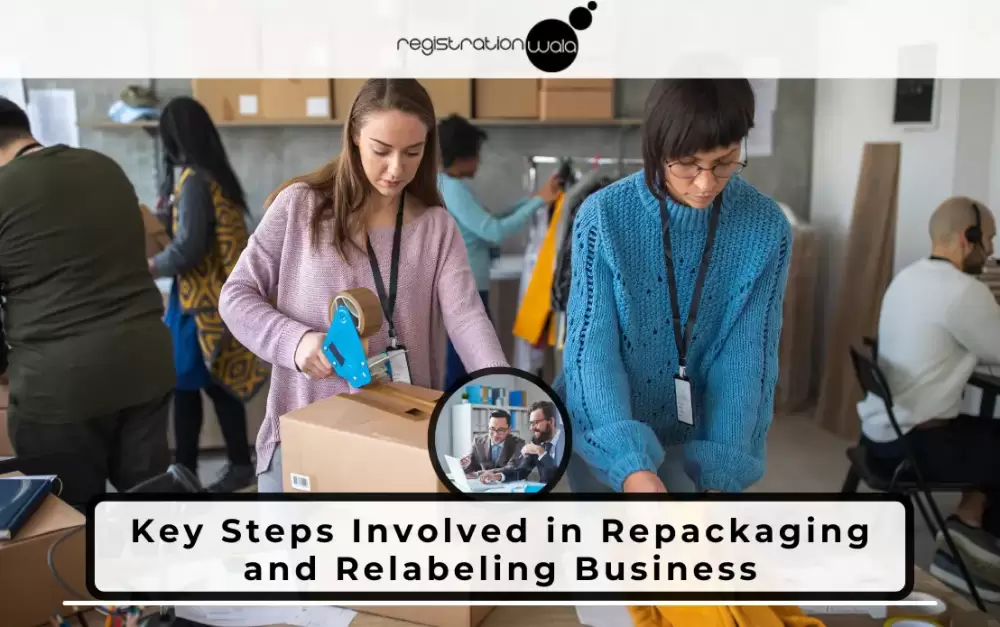Key Steps Involved in Repackaging and Relabeling Business
- July 31, 2023
- Registrationwala

- Home
- /
- Knowledge Base
- /
- Regulatory License
- /
- Packer Manufacturer License
- /
- Key Steps Involved in Repackaging and Relabeling Business
Key Steps Involved in Repackaging and Relabeling Business
The companies can relabel products and sell them under their own brands. They can purchase a product of another business, modify it and resell. The process can be done until it's not violate the intellectual property rights of manufacturers.
The brands can resell the products but cannot claim the “brand new” or “from the manufactured” terms as these are not accepted by the resellers. A business can resell the product which is bought legally, mostly the manufacturer does not have the control once it gets sold to the first customer.
For repackaging and relabelling of a product, the repackaging business must follow the rules and regulations before changing the product. Below are the things which a repackaged business must keep in mind.
What is Repackaging?
Repackaging is a process to change the style, design, and quantity to make it more appealing to customers of a different market. Repackaging businesses use this process to resell products while changing the brand.
In a manufacturing business various steps have been followed such as purchasing, storing, relabeling, distributing, packaging and shipment. But in the repackaging business you simply take the product and replace it with your own details. It is known as “Reverse Passing Off”.
The repacking has different meanings but in a general way it means changing style, design or size of the product. So, repackaging is done to give a new identity to the product.
Point to Remember for Repackaging a Product
If the business just wants to repackage the product for rebranding, then the business must have a packer license. Also, these are the points that you must follow to register a business:
1. Why Do You Need to Rebrand?
The first reason to rebrand the product is to redefine the presence of the brand in the market and get massive customer acquisition. For many businesses rebranding is a way to secure the damaged control of brand image because of any wrong issue or information spread into the public.
2. Risk and Return on Investment
Rebranding is a form of investment, so conducting market research is an excellent way to get an idea whether or not repacking is the right option. On this point, checking the details such as product logo, overall design, creativity, advertising, marketing cost everything must be checked.
3. Repackaging Process
All the stakeholders of the business must be included in the process because the repackaging is an important step of branding. Agreement of all the stakeholders is necessary to successfully implement the process. The product must be authentic and original to the brand, in the process of repackaging the colors and shapes are the vital factors.
Legal Requirements for Relabeling Products
In case, the manufacturer doesn't have an idea about the rebranding, and another business is changing it without the permission.Then it can create trouble for repackagers. The repackaging business can be done only if there is a written agreement between the product’s original manufacturer and the business who wants to rebrand it. Also, the packing license registration must be done before starting rebranding.
If the rebranded product is launched in the market without an agreement then the market should be willing to pay a markup. Here markup refers to the product availability, better packaging, manuals, support and warranty. Another important point, you must comply with the FDA requirements.
As per the Standards of Weights & Measures Act (SWMA), the product details must be written on every retail package. The following details must be made in the product:
- Name and address of the manufacturer or where the manufacturer is not the packer.
- Name and address of the manufacturer and packer.
- Common or generic names of the commodity contained in the package.
- Net quantity in terms of the standard unit of weight or measure
- Month and year in which the commodity is manufactured or pre-packed.
- The retail price and retail sale price of the package.
Top Mistakes to Avoid in Product Repackaging
In the process of rebelling, there are certain mistakes that must be avoided to keep consumers focused on the brand. Some common mistakes are mentioned below:
- Excessive packaging that doesn’t add value or aesthetic to the products can lead to impatience, frustration and disappointment in the end. Keep the packaging interesting, so consumers get a memorable impression.
- Following a generic design will make it tough for customers to differentiate the product from competitors. Unique products will help to form a creative image of the brand.
- Any typographical mistake can show the unprofessionalism, inattentiveness, or ignorance of the brand. Why will consumers trust the brand if they do not spend time in communicating the right message of the brand.
- Unclear messages or guidelines can show the lack of attention to the details and the your brand's final product will reflect it poorly.
- Size of the packaging box must be correct, it should not mislead the product by sizing. Doing this practice will lose your brand’s trust and value you build for years.
Conclusion
To conclude it all, repackaging and relabelling of a product will help a brand to make a new image in the market. Business awareness and visibility builds with new user friendly packaging. So, a repackaging business is a good way to make the product fresh, improves efficiency and safety. Create a positive and lasting impression throughout every step of the purchasing process.
- 9717 views
